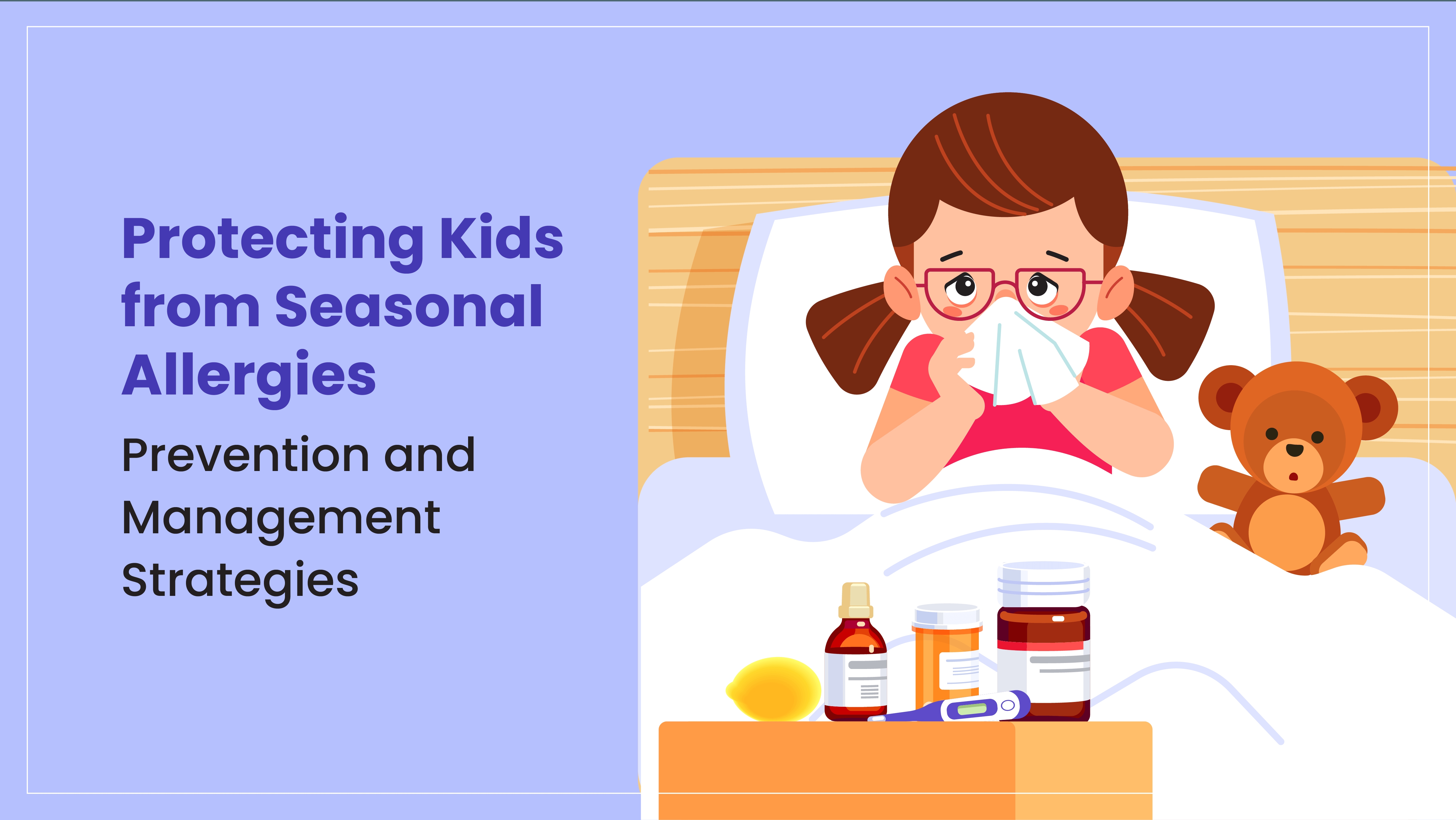Protecting Kids from Seasonal Allergies: Prevention and Management Strategies
Monsoon has finally brought in much-needed respite from the unbearable summer heat. However, the onset of monsoon also coincides with the reopening of schools after a long and hearty summer vacation. Monsoon also brings in a lot of seasonal allergies. Seasonal allergies can be a real challenge for kids, turning what should be a time of outdoor fun into a period of discomfort and frustration. Protecting kids from seasonal allergies involves a mix of prevention, symptom management, and environmental control. By understanding the triggers and implementing effective strategies, parents can help their children enjoy the seasons without the constant struggle against allergies. Here are some essential tips and strategies for preventing and managing seasonal allergies in kids.
Understanding Seasonal Allergies
Seasonal allergies, also known as hay fever or allergic rhinitis, occur when the immune system overreacts to allergens such as pollen from trees, grasses, and weeds. Common symptoms include sneezing, runny or stuffy nose, itchy eyes, and coughing. These symptoms can affect a child’s sleep, school performance, and overall quality of life. Knowing what triggers a child’s allergies is the first step in protecting them.
Prevention Strategies for Managing Seasonal Allergies:
1. Bathing and Changing Clothes: After playing outside, children should take a shower and change into clean clothes to remove any pollen that might have clung to their skin and clothing. This simple step can significantly reduce their exposure to allergens.
2. Maintain Cleanliness: Regularly cleaning the home reduces dust and pollen. Vacuuming carpets and upholstered furniture with a vacuum cleaner that has a HEPA filter, and washing bedding frequently in hot water, eliminates allergens.
3. Consume fresh produce: Avoid pre-packed and processed foods as they contain more fats, sugars, and sodium. Include as many fresh foods as you can—all the colours of different vegetables and fruits keep the child healthy and their digestion good. Stock only nutritious food at home so that kids don’t get their hands on unhealthy snacks.
4. Practice Hygiene: It is extremely important to practice good hand hygiene to ward off germs. Ensure your kids wash their hands thoroughly with soap and water before eating and immediately after they come home from school, playgrounds, or any public places. Encourage them to scrub their hands for at least 20 seconds, covering all parts of their hands, including under the nails. Teach them to avoid touching their face, especially their eyes, nose, and mouth, to minimise the risk of infections. By maintaining these hygiene practices, you help protect your children from various illnesses and keep them healthy.
5. Monitor Pollen Levels: Keeping an eye on local pollen forecasts helps plan outdoor activities. On days with high pollen counts, it is best to keep children indoors, especially during peak pollen times in the morning and early afternoon. Using air purifiers with HEPA ((high efficiency particulate air) filters reduce indoor pollen. Keeping windows closed during high pollen seasons and using air conditioning to filter the air also helps. Regularly changing air filters ensures they are functioning effectively.
Reducing Allergy Symptoms:
1. Nasal Irrigation: Using a saline nasal spray or rinse helps clear out pollen from a child’s nasal passages. This can be particularly effective in reducing nasal congestion and irritation.
2. Hydration: Encouraging children to drink plenty of water helps. Staying hydrated thins mucus, making it easier for the body to expel allergens.
3. Over-the-Counter Medications: Antihistamines, decongestants, and nasal sprays can help manage symptoms. However, it is important to consult with a paediatrician before giving any medication to ensure it is safe and appropriate for their age and condition.
Effective Strategies for Managing Seasonal Allergies:
1. Allergy-Proof the Home: In addition to using air purifiers, investing in hypoallergenic bedding and dust mite covers for mattresses and pillows helps. Reducing exposure to indoor allergens complements efforts to minimize outdoor pollen exposure.
2. Plan Outdoor Activities Wisely: When planning outdoor activities, choosing times when pollen levels are lower, such as late afternoon or after a rain shower, is advisable. These times are typically less problematic for allergy sufferers.
3. Keep Windows Closed During High Pollen Season: While it is tempting to let in fresh air, keeping windows closed during high pollen seasons prevents allergens from entering the home. Using air conditioning to maintain a comfortable temperature is better.
Consulting a Specialist:
If a child’s allergies are severe or not well-managed with over-the-counter remedies, consulting an allergist may be necessary. Allergy testing can identify specific triggers, allowing for more targeted prevention and treatment strategies. An allergist can also recommend prescription medications or therapies such as allergy shots (immunotherapy) that provide long-term relief.
Conclusion
Protecting kids from seasonal allergies requires a proactive approach that combines prevention, symptom management, and creating a safe indoor environment. By implementing these strategies, parents significantly reduce their child’s exposure to allergens and help them enjoy the seasons with fewer allergy-related disruptions. Seasonal allergies prevention in kids is an ongoing effort, but with the right tools and knowledge, it is possible to keep symptoms at bay and ensure a better quality of life for the child. Effective strategies for managing seasonal allergies can make a world of difference, allowing children to embrace the joys of each season without the burden of allergies.


Stay connected, stay informed, and thrive with Narayana Educational Institutions!

Thank you for your valuable information
Thank you for your valuable information our students 🙏
Thank u for your valuable information we keep our child safely
Thank you for your concern to our kids we keep safely and hygenic
Good advice